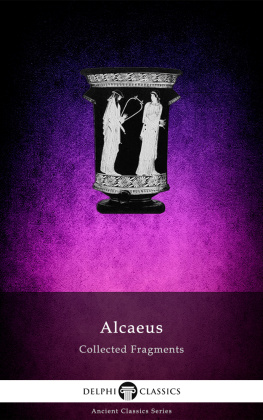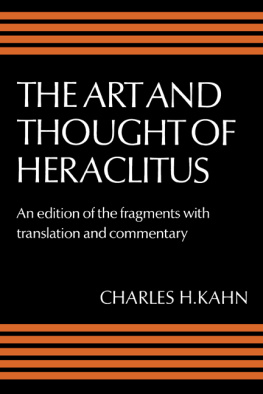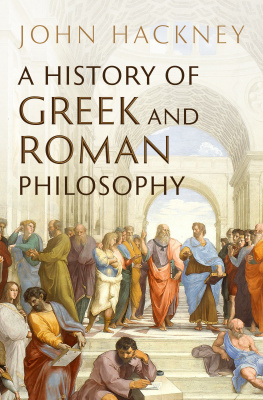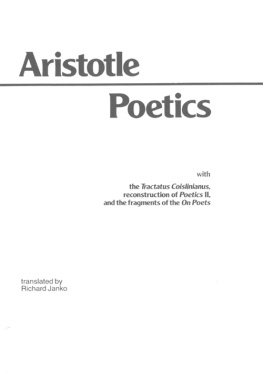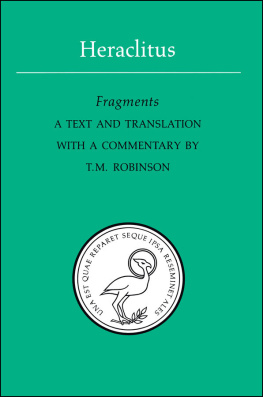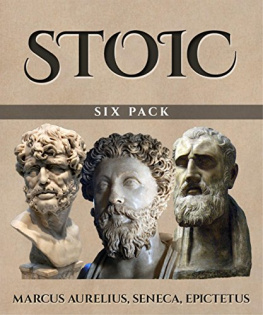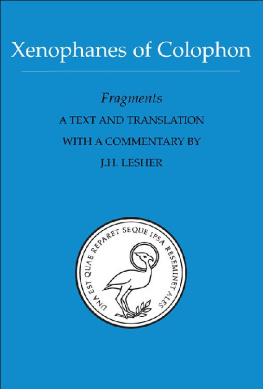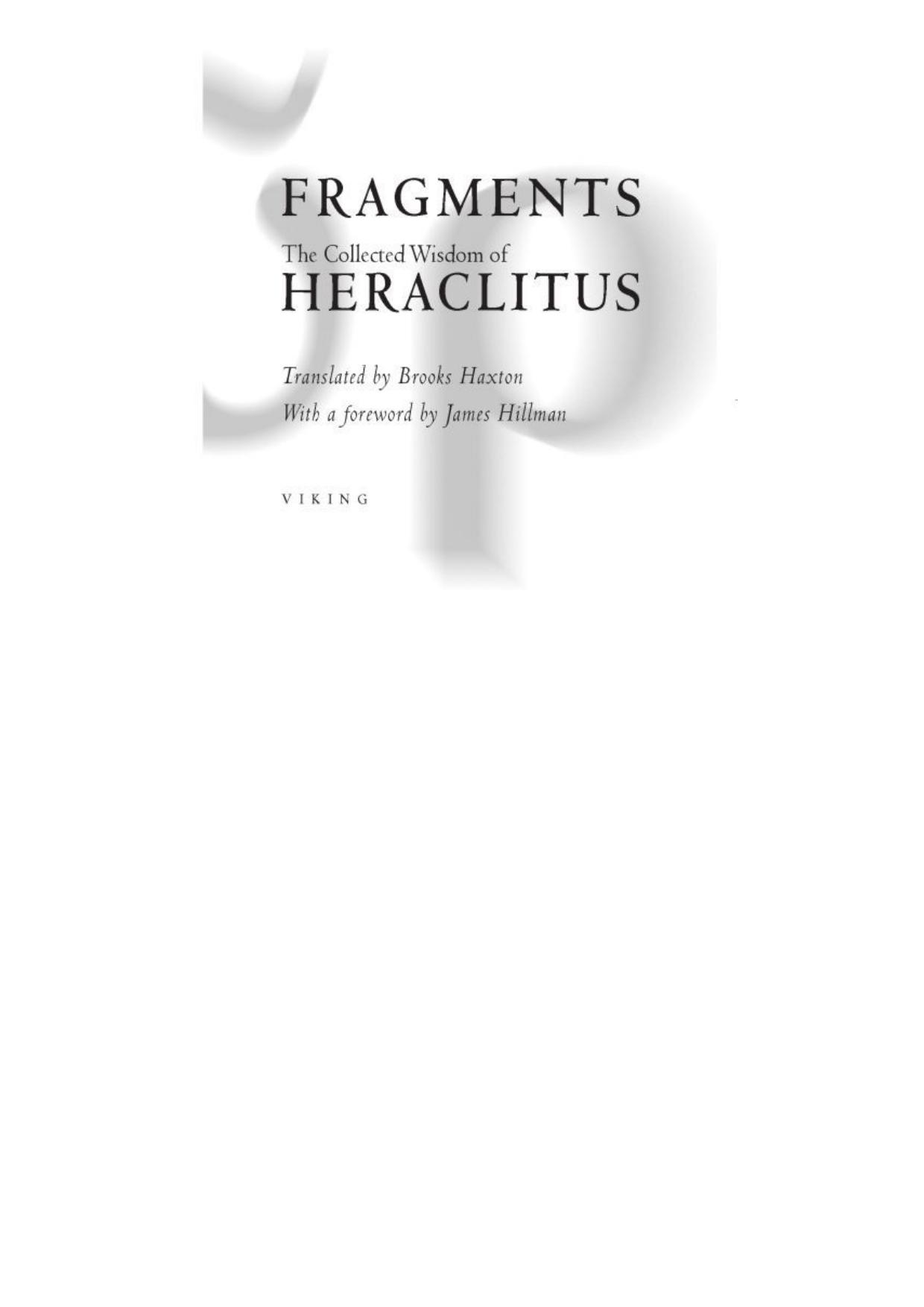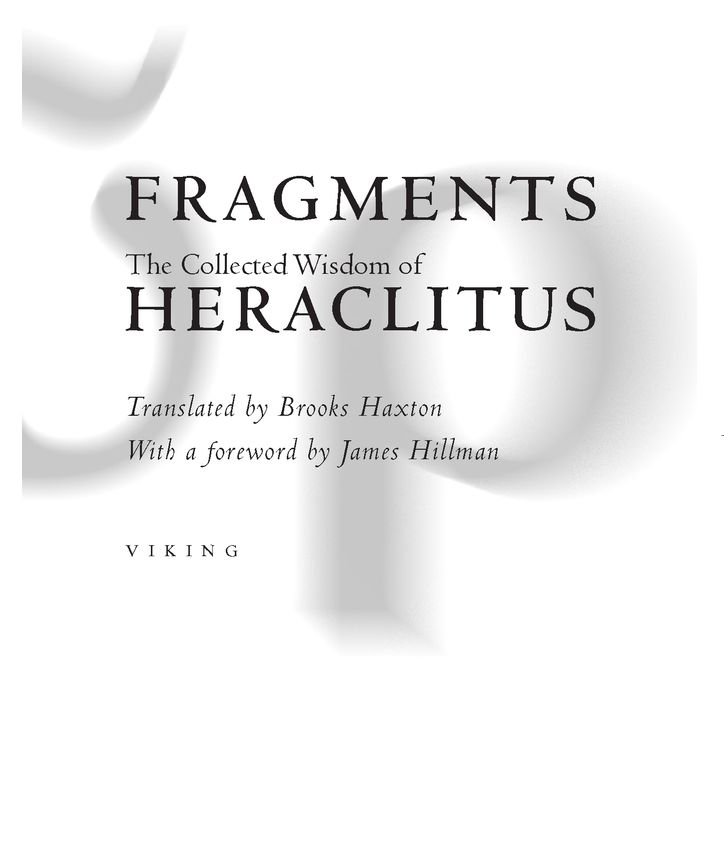Table of Contents
VIKING
Published by the Penguin Group
Penguin Putnam Inc., 375 Hudson Street,
New York, New York 10014, U.S.A.
Penguin Books Ltd, 27 Wrights Lane, London W8 5TZ, England
Penguin Books Australia Ltd, Ringwood, Victoria, Australia
Penguin Books Canada Ltd, 10 Alcorn Avenue,
Toronto, Ontario, Canada M4V 3B2
Penguin Books (N.Z.) Ltd, 182-190 Wairau Road,
Auckland 10, New Zealand
Penguin Books Ltd, Registered Offices:
Harmondsworth, Middlesex, England
First published in 2001 by Viking Penguin,
a member of Penguin Putnam Inc.
Translation copyright Brooks Haxton, 2001
Foreword copyright James Hillman, 2001
All rights reserved
LIBRARY OF CONGRESS CATALOGING-IN-PUBLICATION DATA
Heraclitus, of Ephesus.
[Fragments, English & Greek]
Fragments : the collected wisdom of Heraclitus / translated by
Brooks Haxton; with a foreword by James Hillman.
p. cm.
eISBN : 978-1-440-67928-5
Without limiting the rights under copyright reserved above no part of this publication may be reproduced, stored in or introduced into a retrieval system, or transmitted, in any form or by any means (electronic, mechanical, photocopying, recording or otherwise), without the prior written permission of both the copyright owner and the above publisher of this book.
http://us.penguingroup.com
for Mary Karr
Acknowledgments
The translator would like to thank everyone at Viking who helped to see this book through publication, especially the editor, Michael Millman, for his friendly intelligence, Zelimir Galjanic for thoughtful attention to detail, and Susan Petersen Kennedy for her guiding interest and enthusiasm. Thanks also to my good friend, Ken Frieden, who read an early draft of the translation and offered helpful suggestions and encouragement.
Foreword: I am as I am not
Because archetypal modes of thought transcend time and place, the insights of Heraclitus are strikingly postmodern. Although conceived five hundred years before our era in the Greek city of Ephesus, his poetic aphorisms show a deconstructive mind at work. The life of thought does not necessarily progress, for, as he says, Any day stands equal to the rest (120). Since moving forward and moving back are one and the same (69), the latest postmodern thinking completes the circle where Heraclitus began: The beginning is the end (70).
Early Greek thinkers sought the stuff of which the world was made. For Thales, it was water; for Anaximenes, air; for Anaximander, a combination of hot and cold. Empedocles expanded the stuff to four indestructible elemental principles, while Anaxagoras is said to have proposed innumerable generative seeds composing the nature of things. The Atomists abstracted the seeds yet further, proposing multiple particles moving in a void. The Pythagoreans found the truth of the world lies in numbers, their proportions and relations, and Parmenides, the most metaphysical of them all, laid out his theory of the cosmos through the sheer power of logical thought.
Heraclitus took a different tack. His method is more psychological. He posited no basic substance, nor did he abstract the world of the senses into numbers, atoms, or assertions about Being as a whole. Instead he said, nothing is stable; all is in flux. Whatever you say about anything, its opposite is equally true. He brought language into the game of cosmological thinking. Declarations will always be self-contradictory, relative, subjective. People dull their wits with gibberish, and cannot use their ears and eyes (4). They lack the skill to listen or to speak (6). You cannot know the world in the manner of natural philosophy or mathematics or deductive logic. Because: By cosmic rule... all things change (36). The sun is new again, all day (32). The river where you set your foot just now is gonethose waters giving way to this, now this (41).
His name for this changing flux, or process, in todays terms, is fire, a metaphor for the shifting meanings of all truth. Therefore, the verbal account, or logos, of the world is also fire. Truth, wisdom, knowledge, realitynone can stand apart from this fire that allows no objective fixity.
Heraclitean fire, it must be insisted, is neither a metaphysical essence like the elements of his peers, nor a spiritual energy, nor a material substance, the fire that burns your hand. His fire is metaphorical, a psychological intensity that penetrates through all literalisms, a quicksilver fire that flows through the hand, burning away whatever tries to grasp reality and hold it firm. This fire, as the active principle of deconstruction, brilliantly deconstructs itself.
You can, however, reflect your own mind, see into your own thoughts. You can become psychological or, as he puts it, Applicants for wisdom do what I have done: inquire within (80). People ought to know themselves (106). This psychological turn means you cannot know the psyche no matter how endless your search (71), since consciousness is always also its opposite, unconsciousness. How better say this than: I am as I am not (81).
Statements pertaining to sleep add support to my notion of Heraclitus the psychologist. Rather than a focus upon the healing efficacy of dreams as in the Asclepian cult of his time or upon their prognostic meaning as summed up in Egyptian and later Greek writing by Artemidorus, Heraclitus simply states that the logos is active in sleep. Even while you are resting, the fire burns. Dreaming is the flickering activity of the mind participating in the worlds imagination. Whether the dream helps us feel better and sleep better, cures our distress, or prefigures our destiny, is less its essential nature than its energetic spontaneity. During sleep, we may be each apart from the commonly shared day-world, yet the never-resting logos goes on producing images ever new as the sun each day, as the rivers flowing. In our private rest, the restlessness of the cosmos continues to do its work.
For all the puzzling juxtapositionshot/cold, pure/tainted, war/peace, plenty/faminethat quicken the readers speculations, Heraclitus insists on a keen practical sense of things. No lofty idealism or dulling generalities that smooth over lifes honest hardness. Hungry livestock, though in sight of pasture, need the prod (55). War makes us as we are (62). The poet was a fool who wanted no conflict (43). The mind... needs strength (45).
No sloppy emotionalism either. Heraclitus would hardly be found among enthusiastic revivalists or holistic healers of the New Age. Dry, the soul grows wise and good (74). Moisture makes the soul succumb... (72), which I have understood to be a warning against drowning in easiness. Comfortable, complacent, contentthese soporifics extinguish the fire of the soul.
Moreover, no religiosity. Fragments 116 onward state pithy truths that do not let us escape into wishful denials of realities. Those who mouth high talk may think themselves high-minded (118). Neither your hope nor your fantasies tell you anything about what comes after death (122). The unknown is not revealed by faith (116). Fate is not governed from elsewhere, but is in your character, the way you bear yourself each day (121). Because humans understand so little of the gods (126), the initiations and mysteries we practice are not true holiness (125).
Haxtons English captures Heraclituss toughmindedness: One thunderbolt strikes root through everything (28). War, as father of all things, and king... (44). Hunger, even in the elements, and insolence (24). The mind... that strains against itself, needs strength, as does the arm... (45).


